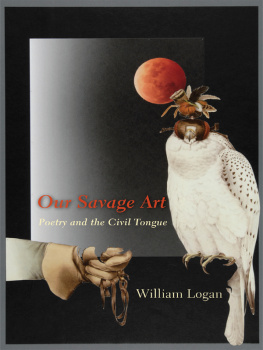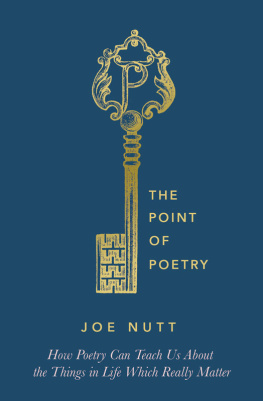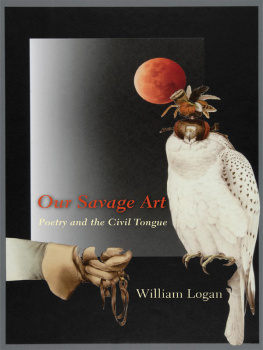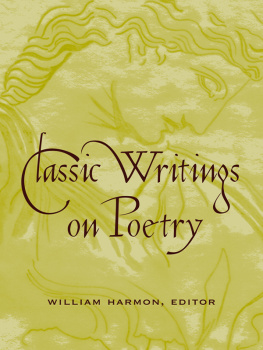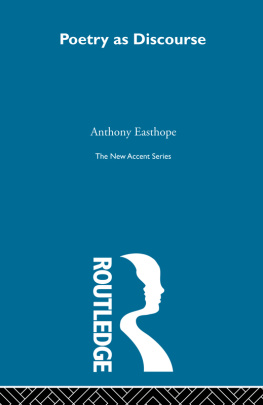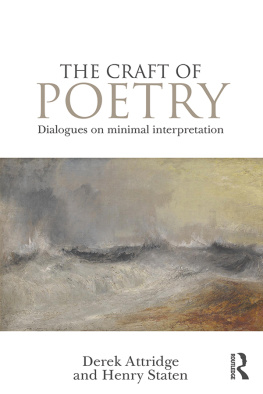our savage art
Also by William Logan
POETRY
Sad-faced Men (1982)
Difficulty (1985)
Sullen Weedy Lakes (1988)
Vain Empires (1998)
Night Battle (1999)
Macbeth in Venice (2003)
The Whispering Gallery (2005)
Strange Flesh (2008)
CRITICISM
All the Rage (1998)
Reputations of the Tongue (1999)
Desperate Measures (2002)
The Undiscovered Country (2005)
OUR SAVAGE ART
Poetry and the Civil Tongue
WILLIAM LOGAN
COLUMBIA UNIVERSITY PRESS New York
COLUMBIA UNIVERSITY PRESS
Publishers Since 1893
NEW YORK CHICHESTER, WEST SUSSEX
cup.columbia.edu
Copyright 2009 William Logan
Paperback edition, 2012
All rights reserved
E-ISBN 978-0-231-51961-8
Library of Congress Cataloging-in-Publication Data
Logan, William, 1950
Our savage art : poetry and the civil tongue / William Logan.
p. cm.
Includes bibliographical references and index.
ISBN 978-0-231-14732-3 (cloth : alk. paper)isbn 978-0-231-14733-0 (pbk. : alk. paper)ISBN 978-0-231-51961-8 (e-book)
1. American poetry20th centuryHistory and criticism. 2. CriticismUnited StatesHistory20th century. I. Title.
ps323.5.l644 2009
811.509dc22
2008036414
A Columbia University Press E-book.
CUP would be pleased to hear about your reading experience with this e-book at .
For Jane Alpert and Judith Vecchione
Contents
N o man who writes for money fails to owe a debt of gratitude to the editors who sign the checks; and I am grateful to the gentlemen who considered my opinions worth the trouble, even at a discount. Many of these editors made my debts the greater by pointing out my errors and infelicities, which more often than not I labored to correct. Im grateful to the editors of the New Criterion, New York Times Book Review, Parnassus, Poetry, Southwest Review, TLS, Virginia Quarterly Review, and Wall Street Journal, as well as to Garrick Davis, the editor of Contemporary Poetry Review, who conducted a placable interview with me.
I have placed two reviews of Thomas Pynchon in a volume otherwise about poetry because there is something, as there was for Melville, intrinsically poetic about the way he writes. They are also here for comic relief.
It was my intention to reproduce, in the essay Frost at Midnight, eight passages from Frosts notebooks in photofacsimile, so that the reader might judge for himself the flaws in the editors transcriptions. The Frost estate, unfortunately, refused permission.
Those mountains certainly do, my lord, rejoined the Countess, pointing to the Pyrenees; and this chateau, though not a work of rude nature, is, to my taste, at least, one of savage art. The Count colored highly. This place, madam, was the work of my ancestors, said he.
Ann Radcliffe, The Mysteries of Udolpho (1794)
Yet, notwithstanding all the attention which these people bestow upon this savage art, for which they have public schools, they are outdone by savages. When one of the English squadrons of discovery was at Tongataboo, several of the natives boxed with the sailors for love, as the phrase is, and in every instance the savage was victorious.
Manuel Alvarez Espriella, Letters from England, 3rd ed., vol. 3 (1814)
The cavalcade had not long passed, before the branches of the bushes that formed the thicket were cautiously moved asunder, and a human visage, as fiercely wild as savage art and unbridled passions could make it, peered out on the retiring footsteps of the travellers.
James Fenimore Cooper, The Last of the Mohicans (1826)
The more a man studies savage art, the more is he struck by the almost universal good taste which it displays. Every chair, stool, or bench is prettily shaped and neatly carved. Every club, paddle, or staff is covered with intricate tracery which puts to shame our European handicraft.
G. A. Cimabue and Coal-Scuttles, Cornhill Magazine (July 1880)
A remarkable peculiarity of their pipe-carvings is that accurate representations are given of different natural objects, instead of the rude caricatures and monstrosities in which savage art usually delights. Nearly every beast, bird, and reptile indigenous to the country is truthfully represented, together with some creatures now only found in tropical climates, such as the lamantin and toucan.
Hubert Howe Bancroft, The Native Races (The Works of Hubert Howe Bancroft, vol. 4, 1886)
This is just what I was told by a carpet manufacturer who was perfectly aware of the ugliness of his wares, who laughed at it, and regretted that it was a necessity. He illustrated it by showing me the kinds of carpets and rugs which sold like hot cakes. It was pitiful, for no Red Indian and no savage negro would ever have designed aught so repulsive. Savage art is never half so savage as that produced by the most enlightened nation on the face of the earth, and English carpets are little better.
Charles G. Leland, Practical Education (1888)
I also got from another fellow a very pretty model of a New Guinea canoe. It cost me no less than three sticks of trade tobacco to become the possessor of this masterpiece of savage art, for its owner evidently valued it highly, though of what use it could have been to him I cannot conceive.
E. E. Ellis, Cassells Picturesque Australasia, vol. 3 (1888)
[The aboriginals] place in artas to drawing, not color-workis well up, all things considered. His art is not to be classified with savage art at all, but on a plane two degrees above it and one degree above the lowest plane of civilized art. To be exact, his place in art is between Botticelli and De Maurier. That is to say, he could not draw as well as De Maurier but better than Bot[t]icelli.
Mark Twain, Following the Equator (1897)
Some men were even relapsing from the point that art had reached on the earlier stage of rim ram rufon the rhythmical prose of alliteration either simple of itself or awkwardly bedizened, like a true savage art, with feathers and gawds of inappropriate stanza and rhyme.
George Saintsbury, A Short History of English Literature (1898)
A man must serve his time to every trade
Save censurecritics all are ready made.
Byron
He was so generously civil, that nobody thanked him for it.
Johnson
T he more criticism I write, the more Im asked to write about criticism; and, the more Im asked to write about criticism, the less I want to write about anything at all. Samuel Johnson once said, When a man is tired of criticism, he is tired of life, or words to that effect; but at times Im just tired of criticism. Then something gets under my skin. The other day, I was sent the proofs of a book of poetry, introduced by a letter from the publisher. The real trouble with most contemporary poetry, the letter said, is that it is piled high, mostly unread and gathering dust, in the attic of its own obscurity. Imagine someone thinking contemporary poetry too obscure, when it isnt half obscure enough! Just as I was feeling rather blue, there was a man handing me an ax to grind; and before I knew it I was writing criticism again. (Readers who persevere with this volume will eventually discover whose publisher wrote such rubbish.)
In the first edition of his great dictionary, Johnson defined a

